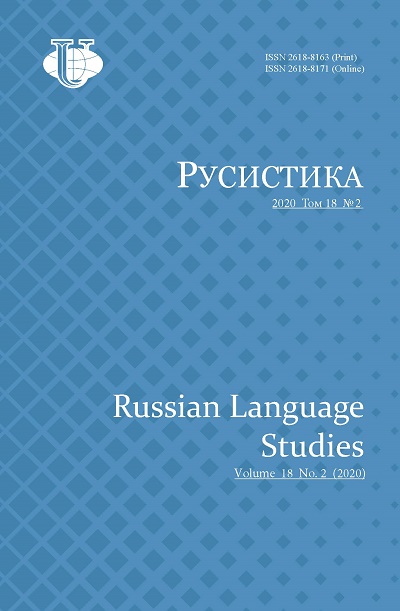Empirical analysis of challenges in learning the Russian language in the University of Nigeria
- Authors: Okoedion E.G.1, Okolie U.C.2
-
Affiliations:
- University of Nigeria, Nsukka
- Delta State University, Abraka
- Issue: Vol 18, No 2 (2020)
- Pages: 152-163
- Section: Russian Language in the World
- URL: https://journals.rudn.ru/russian-language-studies/article/view/23821
- DOI: https://doi.org/10.22363/2618-8163-2020-18-2-152-163
- ID: 23821
Cite item
Full Text
Abstract
Learning a new language comes with its own set of challenges, even the brigh-test students can find the new language to be difficult to understand. Looking at the progress already made in the field of studying Russian in Nigeria in the last fifty-nine years, the language presents some noticeable challenges. This paper is aimed at examining the difficulties of learning the Russian language in the University of Nigeria. A descriptive method was used, and the data were collected as a result of the survey of 36 students studying Russian. The findings revealed that different social and economic factors affect Russian language learning in Nigeria. Also, there was no significant difference in the answers of male and female students about the difficulties in learning the Russian language in Nigeria. Based on the findings of this study, it was concluded that different factors (especially level of education, parents’ occupation and level of income) are among the major difficulties of learning Russian in Nigerian universities. Thus, the study recommends that Nigeria government should encourage the respective universities to teach Russian with better funding and sponsorship of some programs, such as conferences and seminars.
About the authors
Eseohe Glory Okoedion
University of Nigeria, Nsukka
Author for correspondence.
Email: glory.okoedion@unn.edu.ng
Ph.D. Student, Department of Foreign Languages and Literary Studies, Faculty of Arts
Nsukka, 410001, Enugu State, Federal Republic of NigeriaUgo Chuks Okolie
Delta State University, Abraka
Email: ugookolie3@gmail.com
Ph.D. Student, Department of Political Science
PMB 1, Abraka, Delta State, Federal Republic of NigeriaReferences
- Akporherhe, F. (2002). The challenges of English and other foreign languages on Nigerian culture. Journal of Nigerian Languages and Cultures, 3, 29-33.
- Chukwube, C. (2010). Four decades of teaching Russian language in Nigeria: Setbacks and prospects. Proceedings of EDULEANIO Conference (pp. 250-254).
- Csajbok-Twerefou, I. (2013). Challenges in teaching foreign languages to young adult beginners: Russian language in the University of Ghana. Practice and Theory in System of Education, 8(2), 172-184.
- Csajbok-Twerefou, I., Chachu, S., & Viczai, P.T. (2014). Motivations and perceptions of students of Russian and French towards the languages at the University of Ghana. Oxford-shire: Ayebia Clarke Publishing Limited
- Iscan, A., & Karagoz, B. (2016). The use of Turkish films in teaching Turkish as a foreign language: A sample from Hababamsmifi. Participatory Education Research, 4, 190-198.
- Lozanov, G. (1979). Suggestology and outlines of suggestology. New York: Gordon and Breach Sciences Publishers.
- Okoedion, E.G. (2019). The study of Russian language in Nigeria: Problems and prospects. Journal of Danubian Studies and Research, 9(1), 363-372.
- Wagaba, W. (2010). Foreign language teaching and learning: Challenges and opportunities as Makerere University. Linguistics PLUS, 40, 95-109.
Supplementary files














